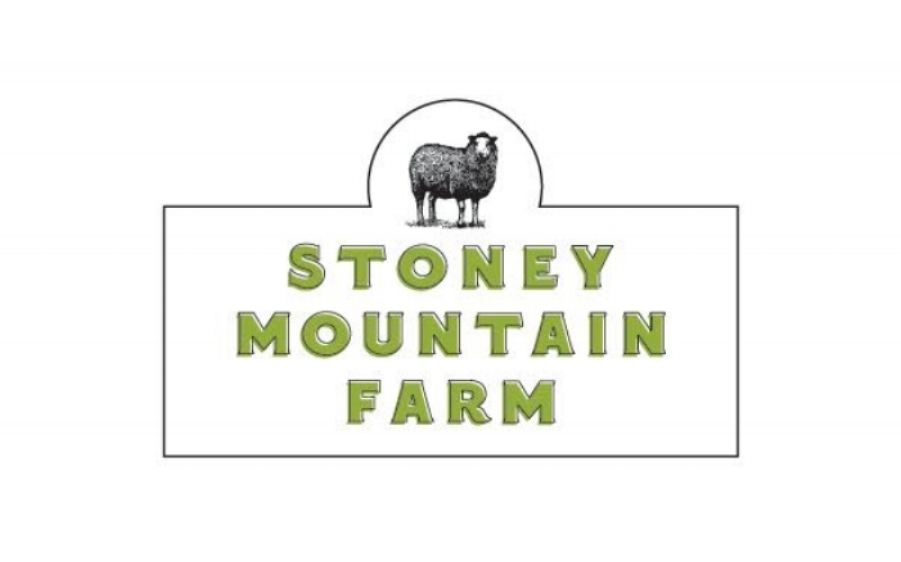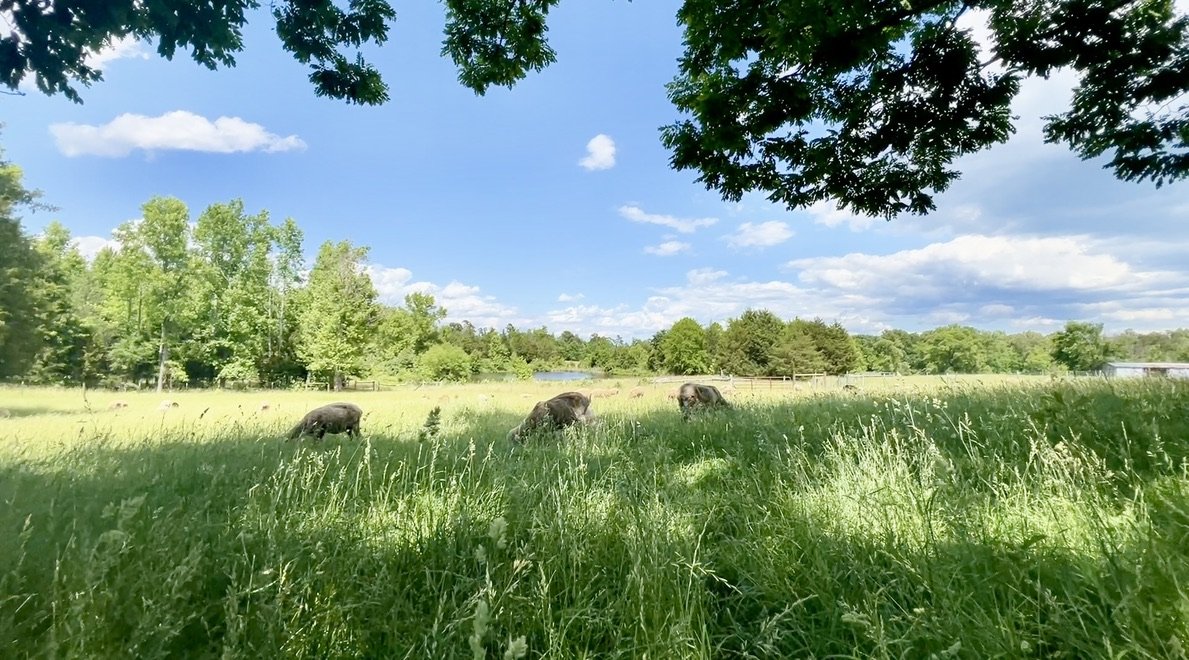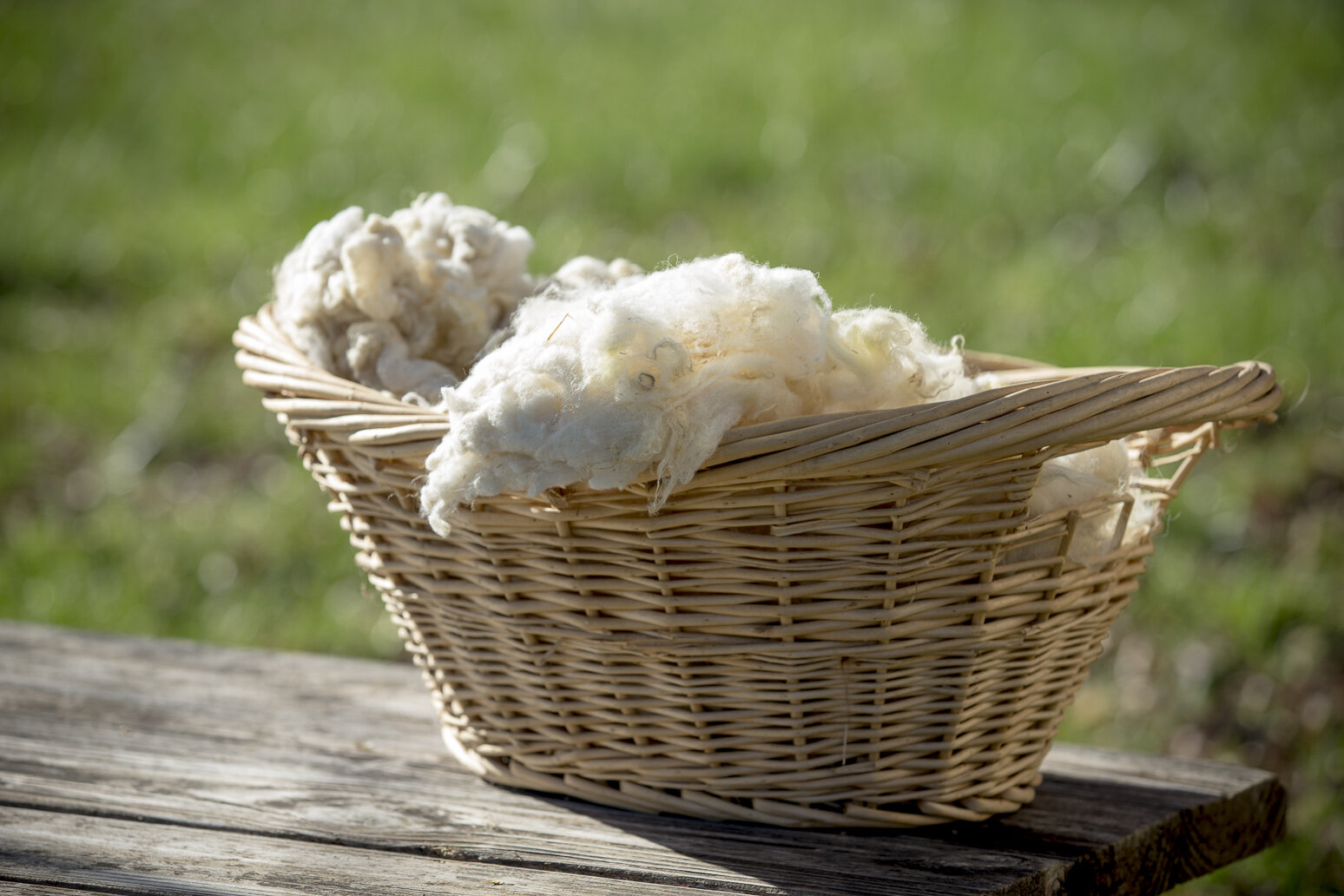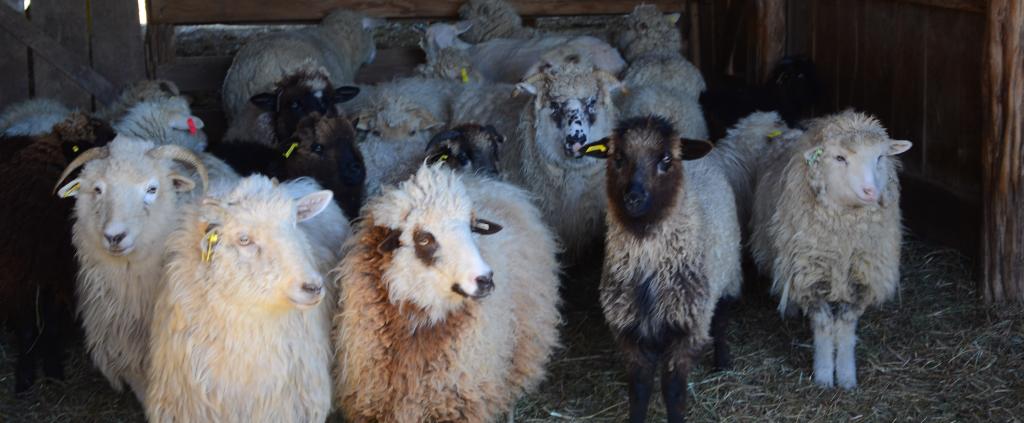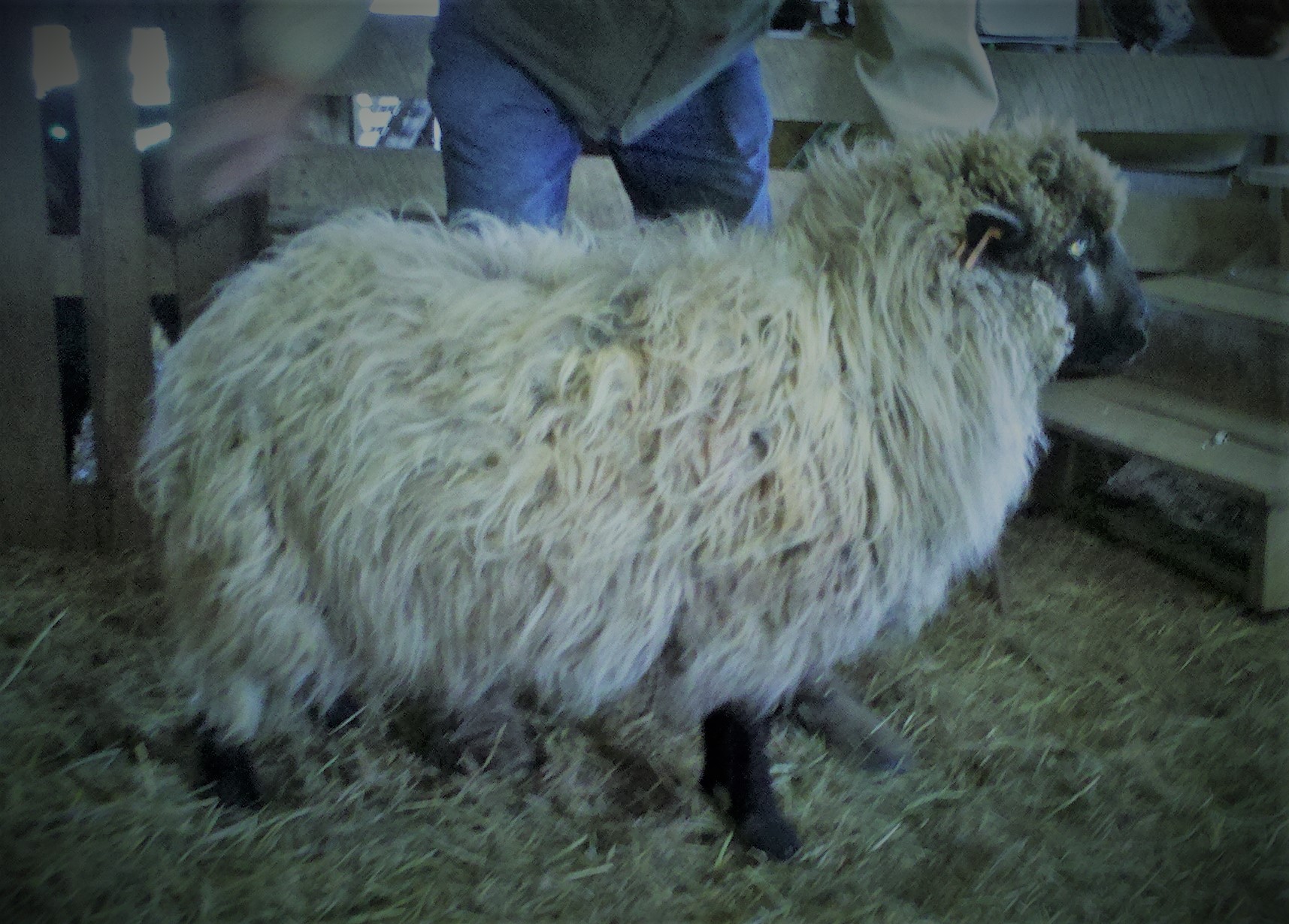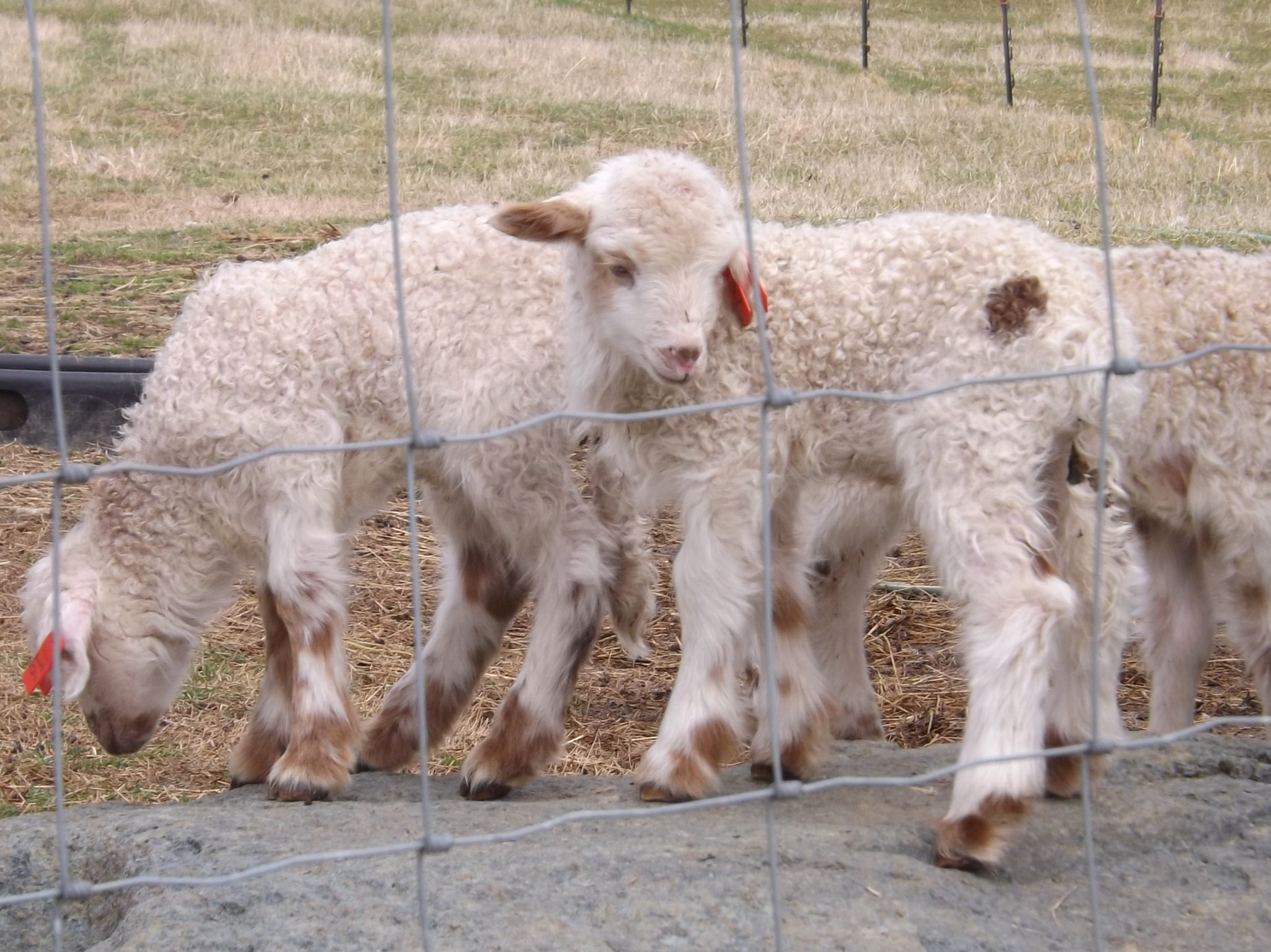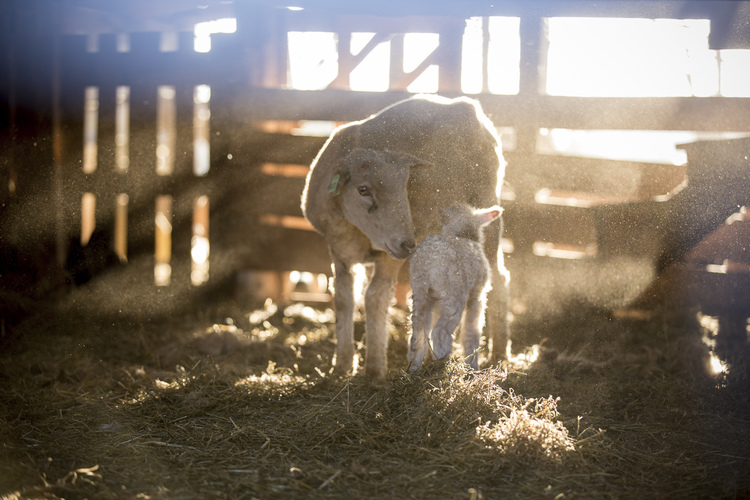
Do Sheep Need a Barn? The Answer is in Their Wool!
Think sheep need a barn to survive? Think again. We're exploring the age-old wisdom of 'sheep wear the barn on their backs…
We have just shorn all of our sheep and for a short time we worry about the sheeps ability to “weather” the weather without their wool coats. A question we often hear: "Do sheep need a barn to stay safe from the weather?" And the answer, more often than not, is a resounding "no!"
While barns can certainly provide shelter, sheep have their own built-in protection: their wool.
The "Barn" They Carry:
There's a saying that beautifully encapsulates this: "Sheep wear the barn on their backs." And it's not just a cute phrase. It's a fundamental truth about sheep and their remarkable adaptability.
Wool as a Natural Insulator: Sheep's wool is far more than just a fluffy coat. It's a complex, multi-layered structure that provides excellent insulation. It traps air, creating a barrier against cold, wind, and rain.
Protection from the Elements: This natural insulation allows sheep to withstand a wide range of weather conditions, from freezing temperatures to heavy downpours. Their wool effectively acts as a portable barn, keeping them warm and dry.
Adaptability and Resilience: Because of their wool, sheep are incredibly resilient. They can graze in open fields, even in inclement weather, without needing to seek shelter in a barn. We actually find the sheep that spend most of their time outdoors have much cleaner wool.
Shelter from the canopy of trees is their first choice
Why Barns Aren't Always Necessary:
Natural Protection: Sheep's wool provides a level of protection that often surpasses that of a basic barn.
Health Benefits: Open-air grazing and exposure to natural elements can actually be beneficial for sheep's health, promoting strong immune systems and overall well-being.
Cost-Effective: Eliminating the need for a large barn can significantly reduce the costs associated with sheep farming. We have shelter for all of our sheep groups but some of them choose the great outdoors!
When Barns Might Be Used:
While sheep are generally well-protected by their wool, there are certain situations where barns might be used:
Extreme Weather: In cases of prolonged, severe weather, such as blizzards or intense heat waves, barns can provide additional protection.
Lambing Season: During lambing season, barns can provide a safe, warm, and dry environment for newborn lambs and their mothers.
Sick or Injured Sheep: Barns can provide a controlled environment for sick or injured sheep, allowing for easier care and treatment.
The Takeaway:
The next time someone asks if sheep need a barn, remember the saying: "Sheep wear the barn on their backs." It's a testament to their incredible adaptability and the remarkable protective power of their wool. While barns can be useful in certain situations, sheep are naturally equipped to handle a wide range of weather conditions.
Caring for sheep hides
Caring for your sheep hides so they last a lifetime.
We get many questions about caring for sheep hides so they’ll last for generations. The first thing I tell folks is to remember, the hide, in its natural state, survived all types of weather and harsh conditions.
The very nature of any household creates dirt and of course accidents have the potential for worse, permanent stains and smells!
You will surely want to clean, or spot clean your hide.
First and foremost, shake it out! That is the single best way to clean the wool. Wool that has become matted down from use can be revived with a good brushing or fluffing. A dog brush with wide spaced prongs works well. Short wool pelts can also be vacuumed.
Simply shaking it out by hand should sufficiently rid the hide of most dust and debris.
If something is spilled on the hide I would immediately blot it with cold water. If that doesn't suffice I would either run it under sink water or a hose on the spot itself.
The hide can be washed on a gentle cycle, with gentle soap and cool water. Do Not Put in the Dryer! Lay flat to dry. As the hide is drying you may want to “work” the leather side as illustrated in my video. Keeping the leather soft and supple is an important goal.
A good reminder from the folks @ Driftless Tannery, “when wetting wool, please make sure to spot clean in one direction, and avoid rubbing the area.
Moisture + wool + agitation = felting!”
Whether your yoga mat, your rug to snuggle your bare toes in, your car seat, your gorgeous decor…these beautiful, naturally tanned hides should last a lifetime if cared for properly.
wool dryer ball transparency
As a new decade rolls out I think it’s time to share some information that many unsuspecting consumers may not be aware of. I realize many consumers make their decisions solely based on price. I also realize there are a whole lot of us that care about the impact of our purchases and want to know what goes into and on the products we buy. We prefer transparency.
The time has come!
We have been making and selling wool dryer balls from our N.C grown wool for over a decade and boy have I seen some changes in our wool dryer ball market! For one, the growth is exponential. When we began, if I mentioned the product, folks looked at me like I had lost my mind. Today, many have not only heard of them, they own them.
When we began this there were a handful of folks making them. We jumped in the game because we are a sustainable sheep farm and to be sustainable we must use what we grow. We had a barn filling up with wool. Many other sheep farmers were struggling with their wool gatherings and what to do with their harvest. We were determined to make it work. SO, wool dryer balls, why not give it a try? They were a huge hit. Folks really want to eliminate chemicals from their environments and provide a healthier home for their loved ones.
When we began there were several players that were buying U.S wool to make their product. We were actually growing our wool while they sourced theirs. Both models work. I mean really, wool dryer balls work! How you source them is totally up to you. I personally would go the extra mile and know the farm(er) to be sure the wool was cleaned without chemicals, that the sheep were handled humanely, and lastly that they were made with as much LOVE as possible…to get that much LOVE requires a fair wage!
In the early days everything seemed very transparent.
What went awry? I cannot help but call it what it is, …people saw an opportunity to supply a niche market with a much cheaper alternative…isn’t that always the way? I hate to admit it but it sure seems there is always someone who wants to jump to the highest margins regardless of ethics. So, those that wanted to capitalize on our growing wool dryer ball biz went overseas (of course) where they could source everything cheaply. The foreign alternatives are cheap mostly because of labor costs but also wool is cheap. Foreign sourced wool is generally cleaned with harsh chemicals that wouldn't be allowed in the U.S. Goodness only knows how the sheep are handled. Recently I heard that much of the wool grown here in the U.S is bought on the dime (maybe penny) from all those farmers that are busy farming and not able to develop markets, then shipped to foreign processors where it will be bleached to death and washed with out any standards, then comes back to you (us).
A few years ago, as I saw it happening, I reached out to a fellow colleague. With a very positive attitude she said, “Know we’re doing the right thing and they won’t bother us”.
Along the way we had wholesale clients call and say they were going to start buying and supplying these imports because “they couldn’t ignore the increased margins”. Sadly these companies (I won’t mention names) very beginnings were about transparency and “for the good of mother nature”?
We are so grateful for the folks that KNOW the difference and really CARE about transparency. We are so grateful to all of the folks that continue to support us.
You ARE making a conscious decision when you purchase our wool products!
Thank EWE!
The Shepherd's Lesson: Sometimes, the Sheep Know Best
As Shepherds, honoring instinctive behaviors in our sheep can sometimes tax our management systems but we should try to honor those instincts when possible.
As shepherds we think we know what’s best for our sheep. The benefit of years watching and learning from these creatures has helped me realize that most of the time, they do know best and don't need our interference. If we’ll listen to them and not try to “project” our human interpretation, we can see that. Sure, we have to get involved from time to time but I’ve found if we trust their instincts and get out of their way, they’ll often take care of things.
Like the ewe that insists on having her lamb in the woods, we let her. Is it the safest? Probably not but that’s what she wants to do. It makes it harder on us once she’s had the lamb to get them to safety but I believe allowing them to have those moments and make those decisions gives us a more mutually respectful relationship.
I’m sure there’s a shepherd or two out there ranting at me right now, “we must be able to manage them and that requires some degree of doing things in spite of their natural instincts.” Like I said, I realize there are times we need to step in and I realize my way isn’t going to align with most others…it’s just my desire to let them be as true to their natural ways as I can. I might pay for it with a little extra effort on my part but I believe I gain by raising sheep that are in touch with their intuitive ways.
The Girls!
The other day I was rehashing a decision to want to keep one of our older ewes back from breeding. She has given us plenty of beautiful babies. She deserves to rest, I thought. So, I did just that. She went to spend her time grazing in green pastures with the teenagers. What a glorious gift, or was it?
Well, to shorten what could be a very long tale, Willow, that’s her name, ended up pregnant anyway. How? We’ll never be 100% sure. Through a fence? Could be, but boys were not in adjoining fences except for short stints while moving sheep? Could she be that fast? One of our lambs might have been more mature then we thought? Like i said, we’ll never know for sure.
A funny thing happened on that day I realized she was with lamb, as I walked away from her pasture something beckoned me to look back. There went Willow trotting away from me and kicking up her heels.
She was mighty happy.
It’s as if she was saying to me, I love being a mom! You don’t get to decide.
I believe I had just been reminded, we’re not necessarily smarter then mother nature!
Willow
Weaning: A Shepherd's Reflection on Loss
A shepherd reflects on the sheep weaning their lambs as she says goodbye to her mother
Year before last we brought my dear mother here to the farm from a nursing home for her final journey. We knew her time was short. As we approach another anniversary of her arrival here and her passing and another year of weaning our lambs from their mommas, I felt compelled to share something that happened during my mother's short time here.
On July 28th 2018, the day before she left this life, John and I were weaning the lambs from their mothers. The window of my mothers room looked out over the pasture where we were. In the process of separating the sheep, I looked up (my heart and mind during those days were never far from her) toward her window and room. At that instant, I couldn't help but feel the magnitude of what we were doing...separating the babes from their mamas.
To WEAN: accustom (an infant or other young mammal) to food other than its mother's milk. accustom (someone) to managing without something on which they have become dependent or of which they have become excessively fond.
We knew my mother was shutting down and that it wouldn't be long. At this moment I felt the arms of mother nature comforting me. Yes, it brought tears but in that moment I felt my mother communicating with me through nature as if to say, it is a fact in life, it is real, and it is happening. Sooner or later we must say good bye.
This year weaning will be no easier then it ever has for us. We don't like separating them and for several years we didn't. What we observed when we didn't wean is healthier lambs (less stress) but the mothers will drop from exhaustion trying to feed their babes and combat the heat. Either choice is difficult and we make our annual determination based on environmental factors (heat, humidity etc) and weigb in the added stress...because it is real! This year we've had such extreme heat I'm thinking not, for now.
I will never, ever, take this process lightly. I never did. Especially now. Nature speaks to me all the time. Many of her messages bring me to tears. This one...well, it really got me and will stay with me.
Not a Washout After All: Shearing Day Success
Rain or shine, farm chores must go on and sometimes, in spite of the conditions, something wonderful happens.
There are certain farm chores that come with the territory. On a sheep farm one annual task we have is shearing. Most folks shear their sheep annually although some of our sheep need it twice a year.. A great deal of our farms success depends on the wool our sheep provide so it’s an important date on our calendar.
Shearing Day
Regardless, the shearing must be done.
Several years ago we decided to make an event of it and include the public. That’s it, we’ll invite folks that have never had the opportunity to see sheep loose their winter coats. Some folks have never even seen a sheep before. As the annual event has progressed it has turned into quite a big ordeal. Hundreds of folks each year come to the farm to see, learn and enjoy the farm setting.
This year will go down as one we’ll NEVER forget.
Shearing for us always takes place in late February or early March. We plan as far out on the calendar as we can but generally cannot set the date too far in advance because setting that date depends on a few things out of our control. Number ONE, we’re dependent on the shearer. As you might imagine, shearers are not easy to come by. When you find one you like you do your best to work closely with them and develop a relationship you both can depend on. Once you get your shearer to agree to a date all the event planning begins. We cater lunch and offer other activities for folks once they get here. How do we know how many people to plan for? Well we don’t really. We generally go by the previous years attendance and add a buffer. So, we order food ahead. We plan help. We commit to a band. Yes a band; there is something special about sitting on a blanket looking out over a pastoral setting, listening to some musicians pickin’ away.
OK, check, check and check. Everything is in order.
The last thing we’re dependent on is the weather. Yup. Counting on the weather is like tossing a coin in the air. Mother Nature is going to do her thing regardless of how much time, money and effort you’ve invested. Once you’ve set the date (as far in advance as you can for obvious reasons) there is no turning back. We’ve all seen a next days weather forecast change or even sun when Al Roker said rain!
Well 2019 shouldn’t have been a total surprise what with the onslaught of rain we’d had. Weeks before and leading up to the day…the rain did not let up. From the first day the extended 10 day weather forecast is posted on television and smartphones, I am tuning in. First thing each morning even before coffee I am reviewing every weather outlet to see the latest predictions. Thursday, before this years event, they had predicted rain all day. THE SUN CAME OUT! Me, the eternal optimism kept imaging Saturday would be the same. Under my breath I also muttered, “it is going to be what it’s going to be”. I knew we’d have to deal with it.
The caterer called giving us the option to cancel or reduce our quantities. A few of the band members came by to say it was OK if we wanted to cancel. Alas, the event had been advertised and the shearer was coming…THE SHOW MUST GO ON.
Saturday began with more rain then I had seen any day that week, POURING! Even if it stopped before the gates opened we’d have mud galore.
How should we prepare? Would people even come?
Although the attendance was certainly down we had some real troopers out here! No one seemed bothered. Most were fully aware what to expect from the weather. Some learned their water resistant clothing wasn’t as water proof as they thought!. Everyone seemed to enjoy themselves! Everyone understood I couldn’t ‘warm’ it up or move the puddles.
We sheared, we ate, we got wet and shivered a bit together and somehow, in the midst of all the rain and mud I so enjoyed the day with way more folks then I’d anticipated. In many ways, I didn’t realize it was raining until I removed my wet clothes!
I had several memorable interactions.
The interaction I most wanted to share is the young girl and her parents who together had been discovering the world of knitting. They had decided, to buy some wool and take it through the process of washing, carding, spinning and finally knitting. They were picking a freshly shorn fleece to buy and I encouraged them while here to pick a sheep and really connect the wool to the source. The family was able to deliberately pick a sheep that attracted her. They were able to pet the sheep and watch the sheep get shorn. With a tear in she and her mother’s eye they shared with me how that experience touched them! They will always connect with that finished handmade piece in a way that cannot be matched! I learned of the girls grandmother in Switzerland that would be so happy to hear their experience.
I will never forget that experience and I will never forget them!
Win, loose or draw with the days finance report…it doesn’t seem to matter after a day like this!
The life of a sheep!
The connection between a shepherd and her sheep
Gabby
I was in the barn the other day and our eyes locked on each other.
My mind raced back over our years together. I was amazed at the many facets of this pretty gals life here on the farm.
The daughter of Willow, another of our very photographed and storied gals here on the farm. Gabby was born several years ago. A real beauty of a lamb! Shiny black and long strong legs with a very happy bounce that took her about the barn and pastures. One day during barn chores I noticed her mother, Willow, seeming to talk to me, she kept baaing at me and standing in one place. I followed her cue and found Gabby, clearly not feeling well. Her wonderful momma kept nudging her with her nose. Gabby didn’t have the strength to even nurse her mother, which of course was her life blood. Long story short, we almost lost Gabby. After weeks of constant attention and TLC she survived and was soon romping again about the pastures.
As a shepherd you become especially connected to sheep you’ve spent such heart rending time with. Anyways, I always noted a sort of smile on this little girls face (she’ll always be a little girl to me).
The first 18 months of her life she got to enjoy just the frolic! Then at her almost 2nd year of life she had a baby of her own but poor Gabby freaked! Her instinct, so viable in the Navajo breed , brought her to a wooded area to have her lamb. She gave birth with ease. As she stood over her newborn trying to put two and two together my husband John spotted her and went to check on her. She saw him coming. A little freaked already, his approach was just too much and she bolted, never to accept her little girl again. We tried and tried but to no avail.
Some farms/shepherds might decide it is time to move her along I felt I couldn’t. One might say the situation was contributory. To our wonderful surprise the next year Gabby raised a beautiful healthy lamb!
As we share this moments glance my human self is sure she too reflects back over our many emotional moments together.
Silly human!
To Wean or not to Wean
Observing a mother and her new born is a heavenly site. We respond based purely on emotions, whether we've actually "mothered" or not. At the moment you lay your eyes on this site all the world around is a blur and all that matters is the true love that halos around them. It is such a pure connection that under no circumstances one should want to come between them, right?
A lot of the methods used in sheep farming are about "management" of the flock. The larger the number your trying to manage the harder it is to keep "order". Orderliness becomes a goal for efficiency. Efficiency adds to profits. Follow me? This is a slippery slope.
Weaning is one of those "management" tools. According to reference books, lambs should be removed from their mothers at 8-10 weeks old. The reasons are mainly that the needs of the lambs for maximum market potential are different then the mamma's. Growth of the lambs requires richer, higher protein grasses or grains which the mamma's don't need. The only way to accomplish such a task is to separate them. The other argument we found (didn't read it in a reference book) to support weaning is the mothers will give and give until they are basically spent. We find the heat of the summer, coupled with the very selfless nature of mom's takes everything out of them and begins to compromise their own health.
For these reasons one might wean.
Wean:accustom (someone) to managing without something on which they have become dependent or of which they have become excessively fond.
Now that I've given you a bit of knowledge about weaning I'd like to share our journey with this decision.
We began this farm knowing we would make choices about the care of our animals based on our experiences, not just because everyone said so. Many topics of care and handling were researched and we found enough disparaging information that we felt strongly our decision to observe first was a worthy one.
Many of our farming practices were established by observing, educating ourselves, then we'd established our way. Weaning the lambs was one really challenging task. Now 8 years later, after going back and forth, this year, we're not weaning again. The first three years we didn't wean. I wish I could tell you why we decided to wean the 4th year but I'm betting we succumb to the "text" book ways. Most other shepherds around us weaned which made us question our decision even more. Our farm was growing and as often happens after you've immersed yourself in something you loose some of your "curiosity" or better yet, the luxury of time to remember to be curious and ask questions.
So, we spent a few years weaning. It is a very difficult task, not physically challenging, just heartbreaking really. They cry and baa for easily 48 hours. The mothers also. Eventually they all settle in but gosh it never felt right. As often I'm guided on this farm, if it goes against nature my heart cannot find peace with it...this is one of those lessons.
With most industrial farming models, maximum growth of the lambs became the shepherds primary goal in order to get those lambs to market fast and efficiently. Is fast and efficient our ultimate goal. Those that know this farm know our answer to this question is NO. We strongly believe you sacrifice so much in order to achieve those fast/efficient goals. It is this very reason that so many breeds of livestock are in danger of being lost for good...they don't meet these industrial models!
In summary, we've have some of the best looking, healthiest lambs ever, happily growing on mothers milk...there must have been some divine wisdom in that!
What I know now....
Before I begin the real content of this post I want to dedicate this to a couple that came to our farmers market booth last week-end. I had the perfect opportunity and a willing audience and so the discussion began. They were looking through our coolers for some lamb. As it happens from time to time, she looked up at me and said,
"how can you do it?"
here it comes, get ready for it, the predictable yet perplexing comment..........
"I could never eat an animal I raised."
Before farming, I never really thought about how food got to our local grocery stores. Through that plastic wrapping at our local SUPER market I felt confident I had enough experience to spot freshness, what else should matter?
Now, as a farmer growing sheep, pastures, eggs (no worries, I'm not laying eggs), and vegi's I have a whole new perspective. I truly didn't have any idea what was involved. I didn't have to know how the food got to me, the choices were provided and available to me and I knew no other options.
My bet is many of you can relate.
I remember once my family was in England for the holidays and we decided on prime rib for our Christmas dinner. We went to a local butcher because that's often the way they still do things in England. He presented Bessie, photos; family photos, and all. The butcher and his family loved Bessie. Needless to say I couldn't eat Christmas dinner.
If I knew then what I know now!
Through my journey I have concluded, we as consumers are so disconnected from the whole dang process.
Every time we take a few lambs to the arbitrator to be processed, we shed a tear, we hold hands and say a prayer, then we bless them ...it never gets easier.
I have really wrestled with this. I've contemplated my options. We could stop raising lamb and I could become a vegetarian. For a variety of personal reasons I won't go into, vegetarianism isn't for me. So, what would I do if I stopped processing our lambs because it was difficult? If I didn't give up meat would I go into the grocery like most of America and buy those hermetically sealed packages of meat from animals pushed through a food chain living uneventful lives with no tenderness or compassion for their uniqueness on this earth?
This is an example of where most grocery store meat comes from.
It would certainly have been easier to do.
And that... would be so hypocritical.
If folks had to engage in the process there would be a much greater respect for the animals and the food on their tables.
If folks would engage in the process or at least be aware, they couldn't eat meat raised in the horrible conditions so many are raised in.
If folks would engage in the process and be aware, fewer people would be eating meat.
In our house, if we are going to consume meat/fish it will be humanely raised which I also believe is difficult (not impossible) to do if not from a small farm and definitely not from a factory farm.
Because of our new found respect for meat and how it gets to our tables, we don't eat a lot of it.
When we do eat meat it is only from healthy happy animals and farms that strive for that. Yes, it's more expensive and that is part of the reason why we eat less.
Regarding the interaction with the customers last week-end, I followed up her comment sharing the content of this soon to be realized blog, in a few less sentences of course. They were so thankful that I shared the experience. I truly believe they will be more respectful of the process.
I want to thank them for reminding me there are people out there that want to know....
Is the boss the farmer or the sheep?
Farm animals are portrayed to most people through children's books. We all have an image of what they each should look like, usually cute and huggable right? You'd be surprised how many folks know what a lamb is but don't know what a sheep is. Many don't have a clue that a lamb is a baby sheep.
There is a lot about sheep folks don't know. For one, did you know there are over 200 different breeds of sheep worldwide. The difference can be dramatic. Some sheep have wool, some don't. Some sheep have horns, some don't. Some sheep have no horns, some have 2 horns, some have 4.
Wild looking you say?
This is a perfect example of the 4 horned genetics in the breed we raise, the
. The 4 horn genetics are not unique to the Navajo Churro. There are other breeds that carry the gene.
What has fascinated us about these sheep with 4 horns is watching their personality develop.
They must navigate their way a bit differently.
They are different then the other sheep.
It's almost as if as wee ones they have a special crown on their heads and they know not why. Eventually they grow into them and understand and respect them.
The horns are so dramatic and cannot be ignored by you or the other sheep.
We've concluded by observing these guys early on in their life,
...they learn to own these horns.
I wonder, is there a message from mother nature?
It has been said, it's our very differences that make us stronger.
As we prepare for our new lamb crop this year we feel sure we will
welcome
at least one ram lamb with four horns.
As a final note of interest
I read somewhere that the Navajo culture prized the multi-horn sheep as a spiritual gift, while the South American cultures believed them to be a "devil" spirit and eliminated them from a flock.
-
March 2025
- Mar 31, 2025 Skirting Wool: The Essential First Step to Beautiful Fiber Mar 31, 2025
- Mar 17, 2025 Do Sheep Need a Barn? The Answer is in Their Wool! Mar 17, 2025
-
February 2025
- Feb 23, 2025 Cherishing Culinary Heirlooms: My favorite Kitchen Utensil Feb 23, 2025
- Feb 11, 2025 Wool Pellets Feb 11, 2025
- Feb 6, 2025 Fresh from the dirt: Horseradish Sauce Feb 6, 2025
- Feb 3, 2025 Lamb Fagioli Feb 3, 2025
-
January 2025
- Jan 15, 2025 Woven Together: How wool changed my life Jan 15, 2025
-
December 2024
- Dec 5, 2024 Seventeen Years of Sheep, Sweat, and Manchego: A Love Story Dec 5, 2024
-
September 2024
- Sep 10, 2024 Back to basics with sheep healthcare Sep 10, 2024
- Sep 10, 2024 Mac and Cheese Bites Sep 10, 2024
-
August 2024
- Aug 12, 2024 Tales of a female farmer Aug 12, 2024
-
July 2024
- Jul 12, 2024 Caring for sheep hides Jul 12, 2024
- Jul 11, 2024 Cucumber Lemonade Jul 11, 2024
- Jul 1, 2024 Cucumber Gazpacho Jul 1, 2024
-
May 2024
- May 23, 2024 Almonds, Sweet and Spicy May 23, 2024
-
January 2024
- Jan 17, 2024 Sheep Fencing Gone Wrong: A Comedy of Errors Jan 17, 2024
- Jan 17, 2024 In the beginning :Tales from the shepherd Jan 17, 2024
-
April 2023
- Apr 3, 2023 The journey to vegetarian, or not? Apr 3, 2023
-
March 2023
- Mar 20, 2023 Making sense of scents, or not... Mar 20, 2023
-
February 2023
- Feb 26, 2023 Lamb Sliders Feb 26, 2023
-
March 2022
- Mar 15, 2022 HOW TO BE THE BEST SHEPHERD: Lessons from a sheep Mar 15, 2022
-
January 2022
- Jan 17, 2022 Lamb Bone Broth /Stock Jan 17, 2022
-
April 2021
- Apr 26, 2021 Farming through Covid Apr 26, 2021
-
June 2020
- Jun 19, 2020 Turning 60 Jun 19, 2020
-
January 2020
- Jan 12, 2020 wool dryer ball transparency Jan 12, 2020
-
September 2019
- Sep 10, 2019 The Shepherd's Lesson: Sometimes, the Sheep Know Best Sep 10, 2019
-
June 2019
- Jun 21, 2019 Weaning: A Shepherd's Reflection on Loss Jun 21, 2019
- Jun 17, 2019 Strawberry Balsamic Basil Pops Jun 17, 2019
- Jun 10, 2019 Collard Salad Jun 10, 2019
-
February 2019
- Feb 28, 2019 Not a Washout After All: Shearing Day Success Feb 28, 2019
- Feb 5, 2019 The life of a sheep! Feb 5, 2019
-
January 2019
- Jan 25, 2019 Lamb Liver Paté Jan 25, 2019
-
August 2018
- Aug 23, 2018 Pokeweed, Friend or Foe? Aug 23, 2018
-
July 2018
- Jul 20, 2018 Cucumbers Galore Jul 20, 2018
-
September 2016
- Sep 5, 2016 Mother Nature's Lessons Sep 5, 2016
-
August 2016
- Aug 23, 2016 Walking the Walk Aug 23, 2016
-
July 2015
- Jul 2, 2015 To Wean or not to Wean Jul 2, 2015
-
February 2015
- Feb 1, 2015 Sustainability & Our Precious Soil Feb 1, 2015
-
July 2014
- Jul 24, 2014 Squash Lasagna Jul 24, 2014
- Jul 24, 2014 Squash Squares Jul 24, 2014
-
June 2014
- Jun 2, 2014 Sustainability...What's it all about! Jun 2, 2014
-
May 2014
- May 29, 2014 What I know now.... May 29, 2014
-
April 2014
- Apr 4, 2014 Is the boss the farmer or the sheep? Apr 4, 2014
- Apr 3, 2014 Felted Chicks Apr 3, 2014
-
January 2014
- Jan 28, 2014 Lamb Ribs Jan 28, 2014
- Jan 26, 2014 DIY Wool Dryer Balls Jan 26, 2014
- Jan 15, 2014 Let the New Year Begin Jan 15, 2014
- Jan 13, 2014 DIY Heat Jan 13, 2014
-
October 2013
- Oct 30, 2013 WHOLEsome Food: EGGS Oct 30, 2013
- Oct 7, 2013 Cinnamon Pickles Oct 7, 2013
- Oct 7, 2013 Dog Biscuits Oct 7, 2013
-
September 2013
- Sep 18, 2013 Peaches, Peaches everywhere Sep 18, 2013
-
August 2013
- Aug 14, 2013 The Spider and the Butterfly Aug 14, 2013
-
July 2013
- Jul 30, 2013 They don't wear galoshes Jul 30, 2013
- Jul 21, 2013 Blackberry Lime Jam Jul 21, 2013
- Jul 11, 2013 Lamb Sliders Jul 11, 2013
- Jul 9, 2013 Our Little Orchard Jul 9, 2013
- Jul 2, 2013 The Hay Bale Fiasco Jul 2, 2013
-
May 2013
- May 17, 2013 My Secret Place May 17, 2013
- May 2, 2013 April. Did I miss it? May 2, 2013
-
March 2013
- Mar 28, 2013 Prada to Carhart Mar 28, 2013
-
February 2013
- Feb 21, 2013 Puttin Up the Fence Feb 21, 2013
- Feb 7, 2013 Lovely Cup of Chai Feb 7, 2013
- Feb 5, 2013 Looking for Llama's Feb 5, 2013
-
January 2013
- Jan 29, 2013 Winter Garden Jan 29, 2013
- Jan 24, 2013 Breeding season on the farm: Sheep Thrills and A farmers imagination Jan 24, 2013
-
September 2012
- Sep 7, 2012 Pickles! Sep 7, 2012
-
June 2012
- Jun 13, 2012 Morning Gifts Jun 13, 2012
- Jun 5, 2012 Finding the Words Jun 5, 2012
-
April 2012
- Apr 13, 2012 The girls and a few token boys! Apr 13, 2012
-
March 2012
- Mar 30, 2012 Flavor! Mar 30, 2012
-
October 2011
- Oct 9, 2011 Hay. A little three letter word that packs a PUNCH! Oct 9, 2011
-
July 2011
- Jul 22, 2011 The Glorious Tomato Jul 22, 2011
-
February 2011
- Feb 10, 2011 Shearing Day 2011 Feb 10, 2011
-
November 2010
- Nov 30, 2010 This farm gives me Goose Bumps Nov 30, 2010
-
July 2010
- Jul 23, 2010 Another aHaa Moment in Farming Jul 23, 2010
-
February 2010
- Feb 24, 2010 Farmers Wearing Lace? Feb 24, 2010
- Feb 16, 2010 Girls with no Coats Feb 16, 2010
-
January 2010
- Jan 4, 2010 Midnite on the farm Jan 4, 2010
-
April 2009
- Apr 22, 2009 Hard Day on the Farm Apr 22, 2009
- Apr 15, 2009 Lamb Meatballs Apr 15, 2009
- Apr 14, 2009 Spring Apr 14, 2009
- Apr 14, 2009 Roasted Coffee Marinated Leg of Lamb Apr 14, 2009
- Apr 13, 2009 In the Beginning Apr 13, 2009
